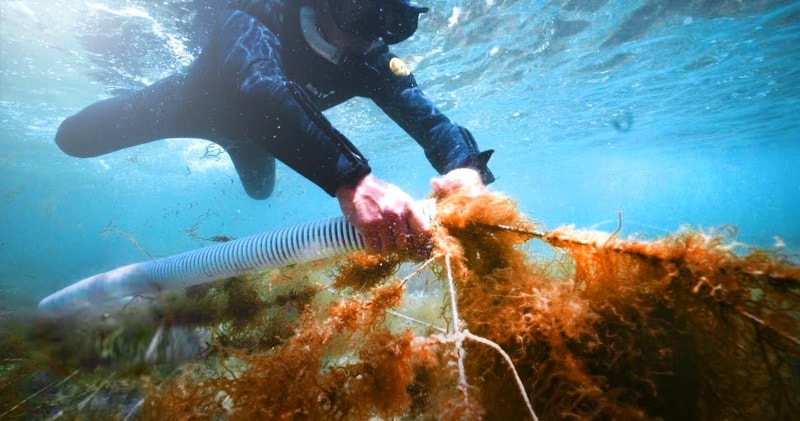Seaweed is a common ingredient in Japanese cuisine.
海藻是日本料理中常见的用料。
But, there's unique type growing in the Pacific Ocean.
然而,太平洋中种植着一种独特的海藻。
Seventy miles off the coast of mainland Japan is the small island of Okinawa.
距离日本本土海岸七十英里(约110公里)的地方是冲绳岛。
Home to one of the most unusual farming methods in the world.
这里有种养殖方法堪称世界上最不寻常的一种。
Mr. Oshiro comes from a seafaring family.
大城先生来自一个航海家庭。
And today, he's one of the farmers growing mozuku, a special seaweed only grown in these waters.
如今,他也加入了种植“水云”的行列,而这种海藻只生长在这片海域。
Each fall, a web of nets are laced with mozuku seedlings on land.
每年秋季,人们都会在海堤上张开布满水云幼苗的网。
Then, Mr. Oshiro and his son lay the nets in rows in the shallow water.
之后,大城先生就和他的儿子将网放入浅水中排成一排。

This ingenious system allows the mozuku to grow sustainably by not creating additional waste.
这个巧妙的系统能够让水云不产生额外的浪费,实现可持续生长。
And when the time is right, it is harvested with two boats and their giant vacuum.
等时机成熟,大城先生就会开着两艘船去用巨大的吸尘器将海藻收回来。
The day’s harvest is then taken to his factory where it's cleaned, weighed and processed.
然后将当天的收获送到他的工厂进行清洁,称重和加工。
Then, it's off to the markets to sell his underwater treasure.
之后就是去市场出售这种水下宝藏的时候了。
Mozuku is in high demand.
水云的市场需求量很大。
It's packed with nutrients, so many people eat it for a health boost.
这种食品营养丰富,很多人都会食用这种产品保健。
But, that wasn't always the case.
然而,情况并非总是如此。
In recent years, Mr. Oshiro has seen a change in the ocean.
近年来,大城先生看到了海洋环境的变化。
So the future of his mozuku is uncertain.
他水云的未来便充满了不确定性。
Despite the challenges, Mr. Oshiro's dedication proves this work is more than just a day job.
尽管面临挑战,大城先生的执着,表明这项工作不止是一天的工作,
For him, it's about maintaining a family tradition and passing on his father's respect for the sea.
对他来说,这份工作还意味着保持家庭传统,传递父亲对海洋的尊重。












